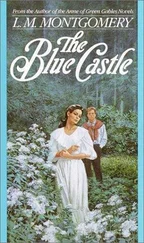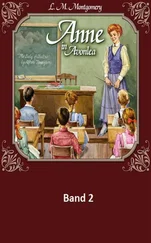She can't bear to have anything said against Teddy, but I guess he can take care of himself.
"Ilse can't study for the Entrance either. Her father won't let her. But she says she doesn't care. She says she's going to run away when she gets a little older and study for the stage. That sounds wicked, but interesting.
"I felt very queer and guilty when I saw Ilse first, because I knew about her mother. I don't know why I felt guilty because I had nothing to do with it. The feeling is wearing away a little now but I am so unhappy by spells over it. I wish I could either forget it altogether or find out the rights of it. Because I am sure nobody knows them.
"I had a letter from Dean to-day. He writes lovely letters — just as if I was grown up. He sent me a little poem he had cut out of a paper called The Fringed Gentian. He said it made him think of me.
It is all lovely but I like the last verse best of all. This is it: Then whisper, blossom, in thy sleep How I may upward climb The Alpine Path, so hard, so steep, That leads to heights sublime.
How I may reach that far-off goal Of true and honoured fame And write upon its shining scroll A woman's humble name.
"When I read that THE FLASH came, and I took a sheet of paper — I forgot to tell you Cousin Jimmy gave me a little box of paper and envelopes — ON THE SLY — and I wrote on it: I, Emily Byrd Starr, do solemnly vow this day that I will climb the Alpine Path and write my name on the scroll of fame.
"Then I put it in the envelope and sealed it up and wrote on it The Vow of Emily Byrd Starr, aged 12 years and 3 months, and put it away on the sofa shelf in the garret.
"I am writing a murder story now and I am trying to feel how a man would feel who was a murderer. It is creepy, but thrilling. I almost feel as if I HAD murdered somebody.
"Good night, dear Father and Mother.
"Your lovingest daughter, Emily, "P.S. I have been wondering how I'll sign my name when I grow up and print my pieces. I don't know which would be best — Emily Byrd Starr in full or Emily B. Starr, or E. B. Starr, or E. Byrd Starr.
Sometimes I think I'll have a nom-de-plume — that is, another name you pick for yourself. It's in my dictionary among the "French phrases" at the back. If I did that then I could hear people talking of my pieces right before me, never suspecting, and say just what they really thought of them. That would be interesting but perhaps not always comfortable. I think I'll be, "E. Byrd Starr.”
CHAPTER 28. A WEAVER OF DREAMS
It took Emily several weeks to make up her mind whether she liked Mr Carpenter or not. She knew she did not DIS-like him, not even though his first greeting, shot at her on the opening day of school in a gruff voice, accompanied by a startling lift of his spiky grey brows was, "So you're the girl that writes poetry, eh? Better stick to your needle and duster. Too many fools in the world trying to write poetry and failing. I tried it myself once. Got better sense now.”
"You don't keep your nails clean," thought Emily.
But he upset every kind of school tradition so speedily and thoroughly that Ilse, who gloried in upsetting things and hated routine, was the only scholar that liked him from the start. Some never liked him — the Rhoda Stuart type for example — but most of them came to it after they got used to never being used to anything. And Emily finally decided that she liked him tremendously.
Mr Carpenter was somewhere between forty and fifty — a tall man, with an upstanding shock of bushy grey hair, bristling grey moustache and eyebrows, a truculent beard, bright blue eyes out of which all his wild life had not yet burned the fire, and a long, lean, greyish face, deeply lined. He lived in a little two-roomed house below the school with a shy mouse of a wife. He never talked of his past or offered any explanation of the fact that at his age he had no better profession than teaching a district school for a pittance of salary, but the truth leaked out after a while; for Prince Edward Island is a small province and everybody in it knows something about everybody else. So eventually Blair Water people, and even the school children, understood that Mr Carpenter had been a brilliant student in his youth and had had his eye on the ministry. But at college he had got in with a "fast set" — Blair Water people nodded heads slowly and whispered the dreadful phrase portentously — and the fast set had ruined him. He "took to drink” and went to the dogs generally. And the upshot of it all was that Francis Carpenter, who had led his class in his first and second years at McGill, and for whom his teachers had predicted a great career, was a country school-teacher at forty-five with no prospect of ever being anything else. Perhaps he was resigned to it — perhaps not. Nobody ever knew, not even the brown mouse of a wife.
Nobody in Blair Water cared — he was a good teacher, and that was all that mattered. Even if he did go on occasional "sprees" he always took Saturday for them and was sober enough by Monday.
Sober, and especially dignified, wearing a rusty black frock-coat which he never put on any other day of the week. He did not invite pity and he did not pose as a tragedy. But sometimes, when Emily looked at his face, bent over the arithmetic problems of Blair Water School, she felt horribly sorry for him without in the least understanding why.
He had an explosive temper which generally burst into flame at least once a day, and then he would storm about wildly for a few minutes, tugging at his beard, imploring heaven to grant him patience, abusing everybody in general and the luckless object of his wrath in particular. But these tempers never lasted long. In a few minutes Mr Carpenter would be smiling as graciously as a sun bursting through a storm-cloud on the very pupil he had been rating. Nobody seemed to cherish any grudge because of his scoldings. He never said any of the biting things Miss Brownell was wont to say, which rankled and festered for weeks; his hail of words fell alike on just and unjust and rolled off harmlessly.
He could take a joke on himself in perfect good nature. "Do you hear me? Do you hear me, sirrah?" he bellowed to Perry Miller one day. "Of course I hear you," retorted Perry coolly, "they could hear you in Charlottetown." Mr Carpenter stared for a moment, then broke into a great, jolly laugh.
His methods of teaching were so different from Miss Brownell's that the Blair Water pupils at first felt as if he had stood them on their heads. Miss Brownell had been a martinet for order. Mr Carpenter never tried to keep order apparently. But somehow he kept the children so busy that they had no time to do mischief. He taught history tempestuously for a month, making his pupils play the different characters and enact the incidents. He never bothered any one to learn dates — but the dates stuck in the memory just the same. If, as Mary Queen of Scots, you were beheaded by the school axe, kneeling blindfolded at the doorstep, with Perry Miller, wearing a mask made out of a piece of Aunt Laura's old black silk, for executioner, wondering what would happen if he brought the axe down TOO hard, you did not forget the year it happened; and if you fought the battle of Waterloo all over the school playground, and heard Teddy Kent shouting, "Up, Guards and at 'em!" as he led the last furious charge you remembered 1815 without half trying to.
Next month history would be thrust aside altogether and geography would take its place, when school and playground were mapped out into countries and you dressed up as the animals inhabiting them or traded in various commodities over their rivers and cities. When Rhoda Stuart had cheated you in a bargain in hides, you remembered that she had bought the cargo from the Argentine Republic, and when Perry Miller would not drink any water for a whole hot summer day because he was crossing the Arabian Desert with a caravan of camels and could not find an oasis, and then drank so much that he took terrible cramps and Aunt Laura had to be up all night with him — you did not forget where the said desert was. The trustees were quite scandalized over some of the goings on and felt sure that the children were having too good a time to be really learning anything.
Читать дальше


